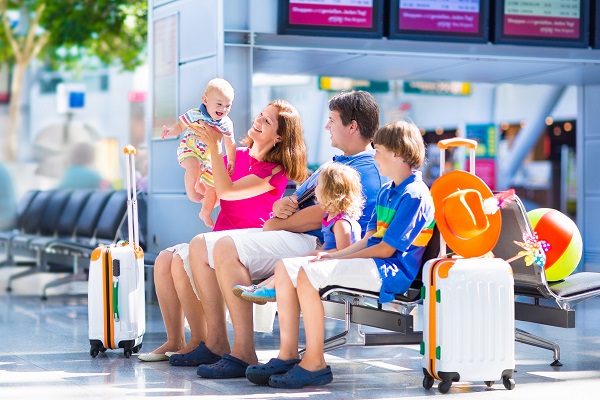Top Tips for the Perfect Family Holiday
Planning the perfect family holiday can be a daunting task, with so many factors to consider, such as choosing the right destination, ensuring all family members have valid travel documents, organising transportation, and of course, packing. Let’s be honest, travelling with children can sometimes be a challenge, whether it’s your first time flying with a newborn, the third or fourth trip with toddlers, or even if you’re trying to keep a restless teen entertained for the duration of the flight. Whatever your circumstances, remember that all the stress feels worth it when you see the smiles on your loved ones’ faces upon arrival. So, to help anyone planning a family holiday in 2025, we’ve put together some top tips to help you achieve the perfect trip.

1. Make it a Family Effort
Why wait until the trip to spend quality time together? Involving your children in the planning stage will help spark excitement early on and give them a sense of ownership over the decisions made and the lifelong memories they will soon be creating. Start by researching destinations that fit your budget and preferences, then ask your children for their opinions on shortlisted accommodations or destination ideas. You could also encourage them to find fun facts about their chosen locations, whether from school lessons or books.
2. Do your Research
The key to a truly perfect family holiday is happy kids and happy parents. Ensure you research destinations that offer something for everyone—not just one or two people in the group. Find a balance between kids’ clubs and activities, relaxing days out, and enjoyable dining options. Consider whether a short-haul or long-haul destination is more suitable for your children, factoring in flight duration as well as travel time to and from the airport and accommodation. You’ll also need to check if your chosen destination requires any vaccinations or health precautions before travelling.

3. Passports at the ready
Now that you’ve finalised your destination, ensure that all family members have valid passports and other necessary travel documents, such as GHIC cards if travelling within Europe, as well as any visas if required. Remember, even babies need their own passports. If you need to apply for or renew a passport, allow extra time for processing delays, as applications can take weeks to be completed and posted. Some countries require visas for entry, so check this as soon as you book. You can visit the UK Government website to find out what documentation you need for your chosen destination and if you require any vaccinations.
4. Prepare, Prepare, Prepare
For some parents, the thought of taking their child to the airport or on a plane is enough to keep them grounded until their child turns 18! However, there’s nothing to worry about as long as you prepare. Pack plenty of snacks, toys, and games to keep them entertained until you land. If your child has a short attention span, plan different games for every half hour, such as spotting landmarks or playing travel bingo.
If travelling with a baby, it’s a good idea to sterilise and prepare bottles in advance to reduce stress, especially in case of delays. Also, pack a small first aid kit, including child-friendly medication like Calpol. Ensure you have your travel insurance provider’s emergency assistance number saved and if you choose Holidaysafe travel insurance make sure you set up Air Doctor Connect for quick access to trusted medical professionals abroad.

5. Out and About
Travelling abroad can present new risks for children, such as hot climates, strong tides, and swimming pools. Keep your child hydrated, protected with high-factor sunscreen, and supervised around water. Babies and young children should be kept in the shade whenever possible—never cover their cot with a blanket for shade, as this can increase the temperature inside.
For the latest sun safety guidance, check the NHS ‘sunscreen and sun safety’ resource before travelling.

6. Introduce some culture
One of the best parts of travelling abroad is experiencing a new culture, but many parents feel disappointed when their children don’t embrace it. The key is not to force cultural experiences on them but to make them fun! Visit historical sites, watch local performances, or try traditional cuisine in a relaxed and engaging way.
7. Disconnect to reconnect
Giving children a tablet for a film or game can be tempting, especially when you need some downtime. However, too much screen time can act as a barrier to family bonding. Try to disconnect from technology and instead use the time to play games, explore new places, or simply enjoy each other’s company.

8. Have a schedule
Most parents know that children thrive on structure. There’s a fine line between being spontaneous and facing seven days of unplanned activities. Create a loose itinerary, such as two days by the pool followed by a day trip, and repeat. Finding a balance between relaxation and fun is key for both children and parents.
9. Don’t Forget to Protect Your Trip with Suitable Travel Insurance
Travel insurance is one of the most important things to arrange when booking a holiday, and it shouldn’t be overlooked. Enjoy your trip with peace of mind, knowing that if the worst happens, you are protected.
At Holidaysafe, we offer a range of travel insurance policies to suit you and your family, whether you need Single Trip or Annual Multi Trip cover.
To get a free quote online today, click here.






